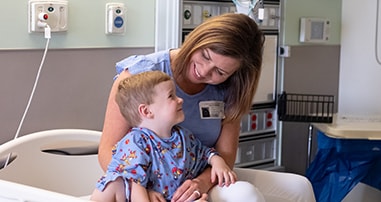At the Children’s Liver Transplant Program, we believe that children deserve the best possible care for complex liver disease, liver tumors and metabolic diseases. Since it’s inception, the Children’s Liver Transplant Program is one of the highest-volume programs in the country, with shorter wait times for donor livers than the national average*. We bring together a multidisciplinary team of specialists who work together to deliver advanced treatments, including:
- Hepatologists
- Liver transplant surgeons
- Oncologists and hematologists
- Interventional radiologists
- Immunologists
- Genetic counsellors
- Metabolic disease specialists
- Advanced practice providers
- Pathologists
At the Children’s Liver Transplant Program, you can rest assured that we understand more than just liver transplants—we understand children. We are skilled in caring for even the smallest patients, and we deliver personalized treatment plans that combine medical management and nonsurgical care, liver surgery and liver transplantation based on each child’s unique needs. We provide coordinated treatment, pre- and post- transplant services and comprehensive support services, delivering a family-centered approach to care that guides you and your child through each stage of treatment to make your experience as seamless as possible.
Why Choose the Children’s Liver Transplant Program?
Child-focused care: We are one of the few transplant programs in the country that has dedicated pediatric transplant surgeons who are dual-trained in both abdominal transplant and pediatric surgery. In addition to liver transplants, we are able to perform complex surgeries of the liver, pancreas and bile ducts.
Liver transplant expertise: As one of the highest-volume liver transplant programs in the country since its inception in 1990*, you can be confident in the team of specialists caring for your child. We deliver coordinated care and work with other programs across the state, serving as a destination referral center.
Comprehensive support services: At Children’s, we understand that a liver transplant is not just a single event, and we provide patients and families with the support they need at each phase of treatment, including pre-transplant care and peri-operative support, as well as short- and long-term post-transplant care.
Seamless transition to adult care: We are dedicated to helping make the transition to adulthood as smooth as possible. We provide post-transplant care for patients until 21 years of age. We provide education, skills and assistance to successfully transfer patients from pediatric to adult transplant care throughout the teenage years.
-
Samerah: Bouncing Back After Liver Transplant
After an emergency liver transplant for sudden onset liver failure, Samerah was able to recover after meeting the challenge with strength and optimism.
Children’s Surgeons Perform World’s Youngest Domino Liver Transplant
Children's Liver Transplant Surgeons performed the world's youngest domino liver transplant. This complex procedure allows for an increase in livers available for transplantation, shortening the wait on the transplant list.
learn more- Referral: We work with Children's and community physicians, as well as physicians across the Southeast, providing seamless referral to our Liver Transplant Program.
- Evaluation: Your child is seen by our multidisciplinary team to assess their need for transplant or alternative therapies to transplant.
- Waitlist: If the clinical team has agreed on the need for transplant, they will add your child to the waitlist for a liver transplant. Children’s Liver Transplant Program has a shorter waiting time than the national average*.
- Transplant Surgery: Our surgeons are skilled in transplant surgery and complex surgeries of the liver, pancreas and bile ducts.
- Follow-up care: We provide post-transplant care in our dedicated outpatient Liver Transplant Clinic.
Children’s Offers Y90 Procedure
In 2023, Children’s became one of the few pediatric centers in the nation to offer Y90 radioembolization, a procedure that can be used to cure or shrink tumors for easier surgical removal.
learn moreChildren may need a liver transplant because they have severe liver problems or a disease that can lead to liver failure.
- Acute liver failure: A sudden loss of liver function in a person without a preexisting liver disease.
- Alagille syndrome: An inherited disorder in which the liver has fewer bile ducts than normal, leading to liver damage and complications of other organs.
- Autoimmune hepatitis: A liver disease that occurs when the body’s immune system mistakenly attacks liver cells, leading to liver damage.
- Congenital hepatic fibrosis: A liver disease that is present at birth in which the blood vessels and bile ducts develop abnormally. This can cause scar tissue to develop in the liver, which can cause severe complications.
- Liver tumor: A tumor that forms in the liver. It can arise from the liver cells or spread from other parts of the body.
- Maple syrup urine disease: An inherited liver disorder in which the liver is unable to break down certain amino acids found in protein-containing foods, causing them to build up in the liver and causing severe health problems.
- Propionic acidemia: A metabolic disorder in which the body is unable to break down certain proteins and fats, causing them to build up in the liver and cause complications.
- Primary sclerosing cholangitis: A liver disease in which the bile ducts become inflamed and scarred, causing bile to become blocked.
- Progressive familial intrahepatic cholestasis: A genetic liver disorder in which liver cells are unable to secrete bile, causing it to build up in the liver.
- Urea cycle defects: A genetic condition in which the liver is unable to remove toxic conditions as it should, resulting in a buildup of ammonia.
- Viral hepatitis: Inflammation of the liver that occurs because of a virus.
Complications of other liver diseases that may lead to liver transplantation include:
- Ascites: A buildup of fluid in your abdomen, often caused by cirrhosis of the liver.
- Gastrointestinal bleeding: Bleeding in either the upper or lower gastrointestinal tract that is often a sign of a more serious condition.
- Hepatic encephalopathy: A condition that results from the liver being unable to filter toxins from the blood effectively, eventually affecting the brain.
- Hepatopulmonary syndrome: A condition caused by liver disease in which blood vessels of the lungs dilate, causing difficulties in oxygen absorption.
- Portopulmonary hypertension: A condition caused by liver disease in which high blood pressure of the veins that lead to the liver cause heart problems.
Liver Transplant Handbook for Patients and Families
At Children’s, we want for patients and families to be prepared if they need a liver transplant surgery. Read our Liver Transplant Handbook for more information about liver transplants, as well as what to expect before, during and after surgery.
Liver transplant surgery, also known as liver transplantation, is a procedure in which doctors remove a sick liver and replace it with a healthy one from a liver transplant donor. There are two types of liver donors:
- A deceased donor liver transplant is the most common type of liver transplant and occurs when your child receives a donor liver from someone who has recently passed away. To receive a deceased donor liver, your child is placed on the United Network for Organ Sharing (UNOS) waitlist.
- A living donor liver transplant is when a living person gives your child part of their liver. The liver is the only organ in the body that has the ability to regenerate, so when doctors remove part of a living donor’s liver, it will grow back in a few weeks.
Types of Liver Transplant
Whether the donor liver comes from a living or deceased donor, there are several different types of liver transplants, including:
- Whole graft transplant: This is a type of liver transplant procedure in which your child’s liver is replaced with a healthy one from a living or deceased donor.
- Partial graft transplant: Also known as a partial liver transplant, this is a type of liver transplant procedure in which only a portion of a donor liver is transplanted into the recipient. The donated liver is cut down to a smaller size and then given to your child and then grows to a normal size after surgery.
- Split liver transplant: A liver transplant procedure in which a donor liver from a deceased donor is cut into two parts. The larger part of the donor liver is given to an adult or larger child, and the smaller part is given to a small child or infant.
- Domino transplant: A domino liver transplant is a procedure in which a donor with a metabolic disorder receives a liver from a deceased or living donor and then donates their original liver to a patient in need without the same metabolic problem, where it functions seamlessly.
We understand that having a liver transplant is a long-term journey for you and your child. Children who undergo a liver transplant will need to take medications to help keep their body from rejecting the new liver and will require follow-up visits and frequent testing to monitor their health.
Support for Liver Transplant Patients and Families
At Children’s, your family is at the forefront of care. You are an integral part of your child’s care team, and we will work with you to create treatment plans that are best for you and your child. We understand that having a child in need of a liver transplant can be a stressful time, and offer a variety of transplant-focused services to help you navigate the emotional, financial and spiritual challenges. Our dedicated support services include transplant financial coordinators who closely work with families throughout the authorization process, transplant nurse navigators who guide your child through treatment, transplant-dedicated social workers and a transplant clinical pharmacist.
- Chaplains
- Child life specialists
- Family experience liaisons
- Financial services
- Transplant financial coordinators
- Camps and support groups
- Transplant-dedicated social workers
- School teachers
- Psychologists
- Transplant clinical pharmacist
- Transplant clinical nurse coordinators
Led by Nitika Gupta, MD and Bhargava Mullapudi, MD, the Children’s Liver Transplant Program is dedicated to caring for infants, children and young adults before, during and after a pediatric liver transplant. Our team includes the following providers:
Pediatric hepatologists
- Reuven Zev Cohen, MD
- Nitika Gupta, MD, Medical Director, Hepatology and Pediatric Abdominal Liver Transplant
- Chrissy Lopez, MD
- Rene Romero Jr., MD System Medical Director, Solid Organ Transplant
- James Stevens, Jr., MD
Liver transplant surgeons
- Bhargava Mullapudi, MD, Division Chief, Abdominal Transplant Surgery; Surgical Director, Pediatric Abdominal Liver Transplant
- Richard Hendrickson, MD
Liver transplant APPs and Clinical Nurse Coordinators
- Gaby Scott, Liver Transplant Clinical Nurse Coordinator
- Ansley Riedel, Liver Transplant Clinical Nurse Coordinator
- Donna Hernandez, BSN, Liver Transplant Clinical Nurse Coordinator
- Rachel Schwartz, PA-C, Liver Transplant APP
- Kaelin Gatewood, NP, Liver Transplant APP
The Liver Transplant Program has a dedicated clinic located on the fifth floor of Arthur M. Blank Hospital.
Arthur M. Blank Hospital
2220 North Druid Hills Road NE
Atlanta, GA 30329
404-785-1807
*Scientific Registry of Transplant Recipients (SRTR) time to transplant for waiting list candidates
Contact Us 404-785-1807







